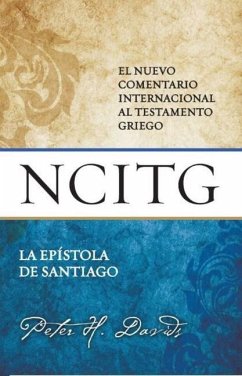Este encomiado comentario de Peter H. Davids interactúa extensamente con la literatura tanto reciente como antigua sobre la Epístola de Santiago, incluyendo obras en alemán y francés. Al mismo tiempo, la profundidad y entendimiento que Davids presenta, estimula un fresco diálogo sobre la composición, propósito, y significado del texto de esta importante carta del Nuevo Testamento. En la extensa introducción, Davids considera las cuestiones de autoría, fecha de composición, forma y estructura, y lenguaje y estilo del texto bíblico. Además, explora siete temas teológicos clave en Santiago: el sufrimiento/la prueba; la escatología; la cristología; la pobreza-piedad; la relación entre la ley, la gracia, y la fe; la sabiduría; y la oración. El comentario en sí muestra una exégesis cuidadosa y una riqueza de entendimiento sobre el significado del texto para la audiencia original y también para la iglesia de hoy. El autor está bien familiarizado con la literatura helenística, judía y cristiana temprana, y la usa con frecuencia para mostrar pensamientos paralelos y clarificar el significado del texto. Su obra también incluye varias ayudas en forma de tablas, gráficas y una extensa bibliografía. This widely acclaimed commentary by Peter H. Davids interacts freely with both the more recent and the older literature on James, German and French works. At the same time, Davids' own penetrating insights themselves spark fresh debate on the composition, purpose, and meaning of the text of James. In an extensive introduction Davids considers questions concerning authorship, date of composition, form and structure, and the language and style of the text. He also explores seven key theological themes in James: suffering/testing; eschatology; Christology; poverty piety; the relation of law, grace, and faith; wisdom; and prayer. The commentary proper exhibits careful exegesis and a wealth of insight into the meaning of the text for its original audience as well as for the church today. Davids is well acquainted with the relevant Hellenistic, Jewish, and early Christian literature and uses it frequently to point out parallels and to clarify the meaning of the text. Davids's work also includes several helpful tables, charts, and one of the most comprehensive bibliographies on James available anywhere.
Hinweis: Dieser Artikel kann nur an eine deutsche Lieferadresse ausgeliefert werden.
Hinweis: Dieser Artikel kann nur an eine deutsche Lieferadresse ausgeliefert werden.








